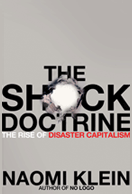The Shock Doctrine

Milton's Wet Dream
Suzi Steffen, Eugene Weekly, December 13, 2007
It seems at once absurd and absurdly low, the price of this new book by journalist Naomi Klein (No Logo). Americans aren't used to spending $28 for a book thanks to the curious lag in hardcover prices compared to inflation. And it's so painful to read Klein's book, a narrative tying torture to economic theory, that even the hopeful final chapter barely rouses a flickering flame of optimism. Who would pay for that? Yet for her meticulously researched tome, for her clarity in explaining just how Milton Friedman and his minions came to dominate world economic discourse by throwing their lot in with the ilk of Augusto Pinochet, whatever recompense she earns can't be enough.
It's a global view, her discussion of shock economics, and its theory is clear: Friedman's Chicago School disciples believe free-market capitalism is the answer to every problem. But many governments try to regulate or soften free markets. In order to remake a state for unrestrained free-market capitalism, the people must be less able to resist. And that happens after a crisis — say, Pinochet's coup in 1973 (and other U.S.-funded dirty wars in Latin America) or, obviously, Sept. 11. Klein links the sudden rise in fortunes of rapacious transnational companies (Jeremy Scahill's Blackwater would be a great companion read) to their ability to capitalize on disasters. The Friedmanites don't cause the disasters; they're just incredibly well-prepared to take advantage of chaos. But, Klein notes, people and governments in Latin America are fighting back — and so can we. Friedman would hate it if you used the "socialized" library services to check out Shock Doctrine or if you banded with friends to purchase it. Small gestures indeed, but another economist, E.F. Schumacher, reminds us that small is beautiful. Or perhaps powerful: Friedman stood only 5 feet tall. — Suzi Steffen
It seems at once absurd and absurdly low, the price of this new book by journalist Naomi Klein (No Logo). Americans aren't used to spending $28 for a book thanks to the curious lag in hardcover prices compared to inflation. And it's so painful to read Klein's book, a narrative tying torture to economic theory, that even the hopeful final chapter barely rouses a flickering flame of optimism. Who would pay for that? Yet for her meticulously researched tome, for her clarity in explaining just how Milton Friedman and his minions came to dominate world economic discourse by throwing their lot in with the ilk of Augusto Pinochet, whatever recompense she earns can't be enough.
It's a global view, her discussion of shock economics, and its theory is clear: Friedman's Chicago School disciples believe free-market capitalism is the answer to every problem. But many governments try to regulate or soften free markets. In order to remake a state for unrestrained free-market capitalism, the people must be less able to resist. And that happens after a crisis — say, Pinochet's coup in 1973 (and other U.S.-funded dirty wars in Latin America) or, obviously, Sept. 11. Klein links the sudden rise in fortunes of rapacious transnational companies (Jeremy Scahill's Blackwater would be a great companion read) to their ability to capitalize on disasters. The Friedmanites don't cause the disasters; they're just incredibly well-prepared to take advantage of chaos. But, Klein notes, people and governments in Latin America are fighting back — and so can we. Friedman would hate it if you used the "socialized" library services to check out Shock Doctrine or if you banded with friends to purchase it. Small gestures indeed, but another economist, E.F. Schumacher, reminds us that small is beautiful. Or perhaps powerful: Friedman stood only 5 feet tall. — Suzi Steffen






















